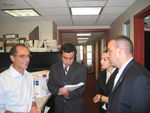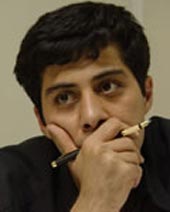Every September, I think about Bijan, Mohammad Reza and Nasser. My school friends from Iran who were executed in the September 1988 massacre of Iranian political prisoners.
I think about their last hour. I guess to myself what they must have been thinking about in the very last moments of their brief lives. They had a whole life ahead of them. We all wanted to do so many things in our lives. They were denied all of it, why? All they cared about was the prosperity of the people of their country. Is that a crime?
When I think about their last hours, I envy their courage and determination. Like all the other victims of the massacre, they were asked two questions that decided their fate, "Do you believe in Allah? Are you prepared to publicly denounce your organisation?". All three of them were the sort of fearless characters that would never bend their head to the oppressors.
Nasser was in my class and Mohammad Reza was his older brother. Being a few years senior to us, we used to look up to him. I remember Mohammad Reza telling me "Don't ever show any fear. Fear is the brother of death. Every time you show fear, you die."
Bijan too was extremely intrepid, he would never run away from a fight. He was also very intelligent. He wanted to become a doctor and treat the poor for free. I am sure he would have been a great asset for Iran and humanity. Who knows if our generation had a normal life and our elders hadn't got us in this mess, he may have found the cure for some ill and saved thousands of lives.
Rest in peace my friends, my thoughts at this time of the year will always be with you three and the other victims of the massacre. Mohammad Reza, I wish I could always be like you and never show fear. Nasser I miss all the fun and the mischief we had together. Bijan, you were a great loss for our nation. Bedrood to you all, my friends.
 I am now in New York, and today had the opportunity to visit the Human Righs Watch offices which is on the 34th floor of the Empire State building. Hadi Ghaemi, Iran researcher with Human Rights Watch, was kind enough to show us around the offices and talk about how the HRW works.
I am now in New York, and today had the opportunity to visit the Human Righs Watch offices which is on the 34th floor of the Empire State building. Hadi Ghaemi, Iran researcher with Human Rights Watch, was kind enough to show us around the offices and talk about how the HRW works.



